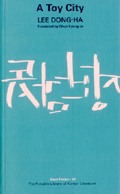Living in the post war period
A Toy City
By Lee Dong-ha
(Jimoondang, 5,000 won)

Written from the perspective of a young boy in elementary school, “A Toy City” shows what it was like to live in the post war period of the 1950s.
An obvious version of author Lee Dong-ha’s younger self, the protagonist, a young boy from Daegu, is overwhelmed when his family moves to Seoul only a few years after the Korean War.
Smart and well-behaved, he was adored by his teachers back in Daegu, being praised as likely to be the “next mayor of the city.”
But nothing is the same in Seoul. He is bullied and picked on by his classmates, while seeing his parents financially struggle at home.
His utterly incompetent father goes out every morning, promising he will bring something to eat at night. But he fails to keep his word almost every day.
And one night, his father does not return home. It turns out he was carrying “something illegal” on a bike and was arrested by the police for it. Having lost his hometown and his father, the boy cannot help but feel totally helpless. While trying his best not to break down in tears, he thinks he’s become a “mute person sobbing hard.”
Born in Osaka, Japan in 1942, author Lee studied creative writing while attending university in Korea. Many of his literary works are known to be autobiographical, delivered in a concise and poised writing style.
Having experienced the Korean War and its aftermath in the 1950s, Lee’s “A Toy City” effectively portrays a young soul living in extreme poverty in a city ghetto. The young character is beset by constant hunger and utter despair. Yet there is strange beauty in his depiction of such wretched living conditions as Lee appreciates the human will even in the harshest reality.
(
clairelee@heraldcorp.com)








![[Today’s K-pop] Blackpink’s Jennie, Lisa invited to Coachella as solo acts](http://res.heraldm.com/phpwas/restmb_idxmake.php?idx=644&simg=/content/image/2024/11/21/20241121050099_0.jpg)